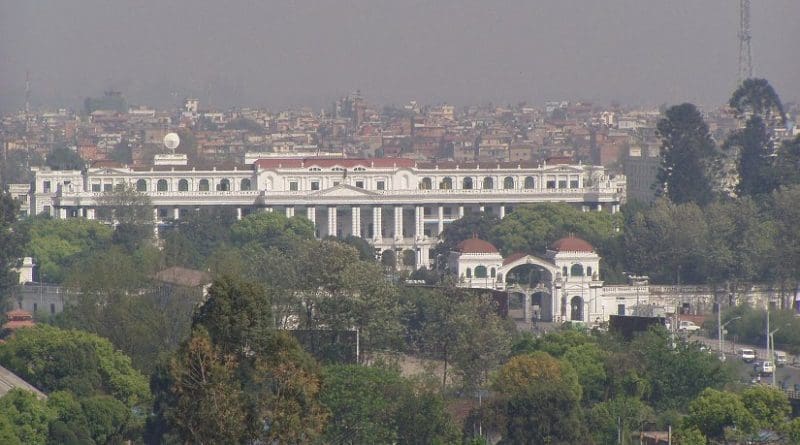Nepal: Tripartite Talks Fail And The Show Continues – Analysis
By SAAG
By Dr. S. Chandrasekharan
On the 10th of December, after many false starts the agitating Madhesi Group UDMF consisting of its four leaders met the representatives of the ruling coalition and the Nepali Congress leaders at Singha Durbar to discuss the demands of the Madhesi leaders.
Dahal in his capacity as coordinator of the High Level Political Coordination committee (HLPCC) was also present.
While the Madhesi leaders pressed for considering their 11 point demand made earlier and asked the three major parties take a common stand, the leaders of the government and the Nepali Congress were only willing to go ahead with the amendments to the constitution relating to proportional representation in State Organs and deciding on the number of constituencies based on population, they were unwilling to make any change in the boundaries of the proposed seven provinces. At best they said that they could settle the question of provincial boundaries within three months through a political mechanism.
The assurance of a political mechanism within three months was vague and the Madhesi leaders pointed out that the government therefore was not keen on any settlement. What they wanted was a “package deal” and the bottom line was the “demarcation of federal boundaries.”
It was no surprise that the talks failed. Laxmanlal Karna- the chief spokesman of the UDMF declared that “Unless the major parties show flexibility to address our concerns, we cannot say that the talks are positive. We gave the 11 point demand to major parties long time ago but they are yet to come up with a common stand vis-a-vis our demands.”
Oil Supplies from China:
Though a tentative agreement was signed with China for trading in oil, its modality, import quantity, transport and viability, so far only1333 Kilo litres have been received. In the beginning of this month over 600 Nepali containers were stranded at Rasuwa Gadhi and the line of waiting trucks extended up to Syaberu bansi, a distance of over 5 Kms. The problem was said to be that the Chinese declined to issue “one day passes” to go to Keyrong- the supply point.
It is now being realised that importing oil from China is not a viable option and one of the NOC (Nepal Oil Nigam) privately admitted that he was not very optimistic about importing fuel from China.
It is not clear whether Nepal is aware that the districts adjoining China like Rasuwa, Mustang, Humla, Mugu, Dolakha and Sndhpalchok are being fully taken care of by China in the matter of supplies without any reference to the central government in Kathmandu.
It is good that Nepal tried to import oil from China and in fact should try to get more commodities from China. It will be realised only then that how Nepal had it easy to get fuel supplies so smoothly and cheaply through India and how difficult it would be to find an alternate source and route through China. It is understood that Nepal has approached Saudi Arabia for 20,000 kilo litres of fuel and here again, there will be problems as the fuel trucks will have to pass through the Terai where the agitation is continuing.
K P Situala’s Admission:
In one of the recent meetings, K.P. Situala, a top leader of the Nepali Congress admitted that the new constitution would not bring political stability in Nepal. For this he has to squarely take the blame as he was the chairman of the drafting committee. He never consulted the Madhesi or the Janajathi leaders who form more than forty percent of the population and thought that with the brute majority he had with the two other leading political parties, could ride rough shod over their interests and promulgate the new constitution. Technically he was right as he had most of the members of the constituent assembly backing him, but forgot that “over forty percent” is not a small number and by no means the constitution be called an “inclusive” one.
For Situala’s arrogance Nepal is paying not only an economic price but a political price too. In one our notes -Note 752 dated 20th November, 2015, we had pointed out howBhutan has gained considerably while Nepal lost by its big and brash moves in dealing with India. India bashing continues at all levels of the government and of the media too. India can afford to sit tight but Nepal cannot continue on this “mode” indefinitely.
Some of the leaders in Nepal are making irresponsible statements that Nepal should go to international entities with their complaints against India. It is hoped that good sense will prevail and if India has to correctly follow the international rules, it is Nepal that will suffer. It looks that Nepal has not really understood the new political dynamics of its neighbouring country- India. How else can one explain-India inviting the agitating Madhesi leaders to Delhi and discuss the ongoing agitation with the decision makers in Delhi? It is time that some way is found to end the Madhesi agitation and a package deal that would save the face of both the government and the Madhesi leaders could to end this crisis.
Earlier it is done ,better it would be for both the parties and India too. At a later stage, with a new government elected under the new constitution, Nepal’s leaders could decide on what kind of relationship they should have with India so that the differences that have risen now could be avoided in future.


While India bashing continues unabated in Nepal it would be prudent to continue efforts to secure the interests of Terrai region constituting 40% of the population for overall political stability in Nepal . It is also worthwhile to test the hollow claims of ‘Oil weapon’ and ‘oil pipe line from China”closer relation with China’ held as threat against India policy in the region.